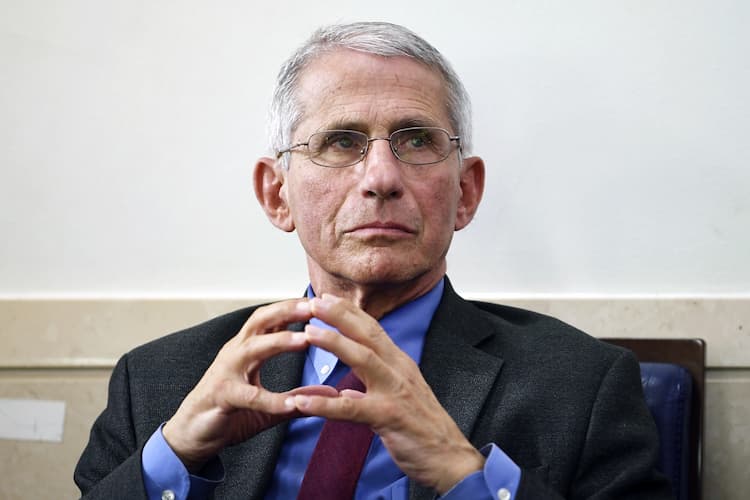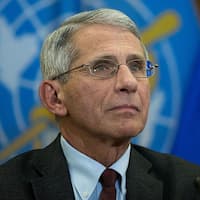Anthony Fauci Biography
Anthony Fauci is a physician-scientist and immunologist from the United States who serves as the Director of the National Institute of Allergy and Infectious Diseases (NIAID) and as the President’s Chief Medical Advisor.
How old is Anthony Fauci? – Age
He is 82 years old as of 24 December 2022. He was born in 1940 in Brooklyn, New York, United States. His real name is Anthony Stephen Fauci.
Where did Anthony Fauci go to College? – Education
Fauci went to Regis High School in Manhattan’s Upper East Side, an elite Jesuit school. Fauci entered the College of the Holy Cross after graduating in 1958, earning a Bachelor of Arts degree in classics with a pre-med track in 1962. Fauci then went to Cornell University’s Medical College (now Weill Cornell Medicine), finishing first in his class with a Doctor of Medicine degree in 1966. He then completed an internal medicine internship and residency at New York Hospital-Cornell Medical Center (now Weill Cornell Medical Center).
Anthony Fauci Family- Siblings
He was born to Eugenia Lillian and Stephen A. Fauci. His father was a chemist with a degree from Columbia University who had his own firm. Fauci’s mother and sister worked behind the counter at the drugstore, while he delivered medications. The pharmacy was in Brooklyn’s Dyker Heights neighborhood, right beneath the family’s previous home in the Bensonhurst neighborhood. His grandparents immigrated to the United States from Italy in the late 1800s. His paternal grandparents, Antonino Fauci and Calogera Guardino, were from Sciacca, and his maternal ancestors were from Naples. His maternal grandmother, Raffaella Trematerra, was a seamstress, and his maternal grandfather, Giovanni Abys, was a Swiss-born artist noted for landscape and portrait painting, magazine illustrations in Italy, and graphic design for commercial brands.
Anthony Fauci Wife- Spouse
Fauci married Christine Grady, a nurse and bioethicist at the National Institutes of Health, in 1985 after they met while treating a patient. Grady is the director of the National Institutes of Health Clinical Center’s Department of Bioethics. They have three adult daughters together.
Anthony Fauci Net Worth
He has an estimated net worth of $10.5 million.
Who does Anthony Fauci work for?- Career
Fauci joined the National Institutes of Health (NIH) as a clinical associate at the Laboratory of Clinical Investigation of the National Institute of Allergy and Infectious Diseases (NIAID) after finishing his medical residency in 1968. (LCI). In 1974, he was named head of the LCI’s Clinical Physiology Section, and in 1980, he was named chairman of the National Institute of Allergy and Infectious Diseases’ Laboratory of Immunoregulation. In 1984, he was named director of the National Institute of Allergy and Infectious Diseases, a position he currently occupies. Fauci has been offered the directorship of the National Institutes of Health on multiple occasions, but has declined each time.

Fauci has been a leader in the fight against viral infections such as HIV/AIDS, SARS, Swine Flu, MERS, Ebola, and COVID-19 in the United States. Following the 9/11 terrorist attacks, he was instrumental in establishing the President’s Emergency Plan for AIDS Relief (PEPFAR) and advancing the development of biodefense medications and vaccines. Fauci has been a visiting professor at a number of medical facilities and has been awarded honorary doctorates from universities both in the United States and internationally.
Anthony Fauci Accomplishments
Fauci is known for outlining the methods by which immunosuppressive medicines adapt to that response and for making critical scientific insights that helped to the understanding of the control of the human immune system. He found treatments for disorders including polyarteritis nodosa, granulomatosis with polyangiitis, and lymphomatoid granulomatosis, which were once fatal. Members of the American Rheumatism Association ranked Fauci’s work on the treatment of polyarteritis nodosa and granulomatosis with polyangiitis as one of the most important advances in patient management in rheumatology over the previous 20 years in a 1985 Stanford University Arthritis Center Survey.
Fauci has helped to advance knowledge of how HIV damages the body’s natural defensive mechanism, leading to AIDS. He revealed the processes of endogenous cytokines inducing HIV expression. Fauci has focused on developing treatment and immunological reconstitution options for HIV patients, as well as a vaccine to prevent HIV infection. His present research focuses on determining the nature of HIV infection’s immunopathogenic processes as well as the spectrum of the body’s immunological responses to the virus.
According to the Institute for Scientific Information, “Fauci was the 13th most-cited scientist among the 2.5 to 3.0 million authors in all disciplines worldwide who submitted articles in scientific journals” from 1983 to 2002. Fauci has been described as “a persistent voice for science, a guy who, more than any other figure, has brokenred a generational truce” between the worlds of research and politics throughout his time as a government scientist under seven presidents.
Anthony Fauci COVID-19
Fauci served on the White House Coronavirus Task Force, which was formed in January 2020 to combat the COVID-19 pandemic. He projected that the infection fatality rate would be close to 1%, ten times higher than the seasonal flu incidence. The CDC advised against using non-surgical masks to limit community transmission, but Fauci pushed for them. Anti-lockdown demonstrators have chanted “Fire Fauci” in several locales, including Florida and Texas. The White House denied that President Donald Trump was firing the head of the CDC, blaming the media for exaggerating the situation.
Fauki received death threats and needed a security detail as a result of Trump’s resistance to CDC mask-wearing rules and social distancing measures, which he supported. President Trump openly asserted on July 9, 2020 that Dr. Anthony Fauci “made a lot of mistakes” during the coronavirus outbreak in the United States. In February 2020, he indicated there was no need to adjust anything on a day-to-day basis, according to a White House list of alleged blunders. Conservatives questioned his ideas for dealing with the pandemic as late as September 2020. He also took issue with his statements being used in a Trump campaign advertisement praising Trump’s management of the pandemic. In October, he labeled the Great Barrington Declaration’s herd immunity policy of “targeted protection” “stupid” and “extremely hazardous.”
Dr. Anthony Fauci stated on October 18, 2020 that he “wasn’t shocked” Donald Trump contracted COVID-19. During a presidential call the next day, Trump referred to the CDC director as “a disaster” and stated that “people are tired of COVID.” During a rally in Florida in November 2020, Trump hinted that he would fire Fuaci “after the election.” He said in early May 2021 that Americans who have been properly vaccinated against COVI-19 do not need to wear masks outside, save in “very crowded situations.” Due to the far more contagious Delta variety, this guideline was modified in July 2021 to recommend that everyone wear masks. Fauci began working as one of the lead members of the White House COVID-19 Response Team and as Biden’s primary medical advisor after Joe Biden took office.
Anthony Fauci HIV AIDS
During the early 1980s AIDS epidemic, he was one of the most prominent researchers. He and his team of researchers started seeking for a vaccine or cure for this unique virus in 1981, but they ran into a number of roadblocks. Protesters gathered at the National Institute of Allergy and Infectious Diseases in October 1988. Fauci, who took over as director of the institute in 1984, took the brunt of the outrage from the LGBTQ+ community, which had been largely disregarded by the government.
In the media, leading AIDS activist Larry Kramer constantly criticized Fauci. He referred to him as a “incompetent moron” and a “pill-pushing” medical establishment tool. Although many people thought Fauci wasn’t doing enough, he didn’t have authority over medicine approval. In the late 1980s, Fauci made an effort to reach out to the LGBTQ+ community in New York and San Francisco to see if he and the NIAID could come up with a solution. Though Fauci was first chastised for his handling of the AIDS crisis, his contributions to the community were subsequently recognized. Fauci was finally dubbed “the sole true and great hero” among government officials during the AIDS crisis by Kramer, who had spent years criticizing him for his handling of the HIV/AIDS epidemic.
In 2014, HuffPost’s Sean Strub accused Fauci of “rewriting history” by “delaying marketing of an AIDS medication that would have averted tens of thousands of lives in the early years of the epidemic.”

